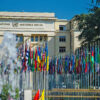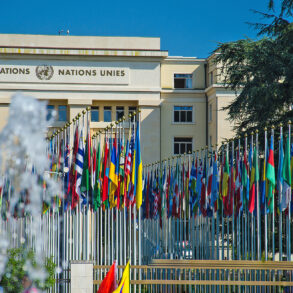Peace negotiations: Stakeholders around the world have long been asking what solutions might look like
The Conversation/GFP.com – In early August, a negotiation process began in Jeddah, Saudi Arabia, to find a peace solution to the ongoing Russian war on Ukraine. By Philipp Kastner
Not only Western representatives from the US, the EU and the Rammstein Group are taking part in the high-level process. The Saudi crown prince has also succeeded in involving important states such as China, India, and Brazil.
While US experts had already held initial talks with Moscow officials such as Foreign Minister Sergey Lavrov in the spring, Ukraine was involved in negotiations with other states on 24 June in Copenhagen, including five powers from the global South, which are themselves trying to mediate.

Photo: Hanna, Adobe Stock
Kiev wanted to make the withdrawal of Russian troops a precondition in the Danish capital. Germany was represented by Jens Plötner, Chancellor Scholz’s chief foreign policy advisor. The talks in Jeddah follow on from this.
The question of the conditions under which talks on an end to the arms race can be held is highly topical. Peace talks to end armed conflicts are currently taking place in several African countries.
Since very few conflicts are fought on the battlefield, negotiations are essential. But they often fail. And even when an agreement is reached, it does not always last.
What are success factors for peace negotiations?
First, peace negotiations are complex. If this were not the case, conflicts would be resolved more quickly, and peace agreements would last longer. It is important to recognise this complexity.
Considerable expertise in peace mediation has developed over the past decades. The African Union (AU) and the United Nations have established mediation teams. Several specialised NGOs have been established such as the South African-based Accord and the Swiss-based Centre for Humanitarian Dialogue.
These actors, together with regional powers and other states, often carry out several peace initiatives simultaneously. This can be helpful in addressing the complexity of armed conflicts.
As an international law scholar and peace researcher, I have analysed many different peace negotiations and agreements. In Africa, there have been some great successes, such as the 1992 peace agreement that ended the 16-year civil war in Mozambique. But there have also been spectacular failures, such as in Sierra Leone, where fighting flared up again in 1999 shortly after a comprehensive agreement was reached.
Based on my research, I would argue that there are four key factors that determine the success (or failure) of mediation efforts. These include sustained multi-stakeholder commitment to peace-making, serious efforts to build trust and listen to grievances, adherence to a timetable, and acceptance of peace as a process.

Photo: Hanna, Adobe Stock
Building peace
First, the peace process has a better chance of succeeding when the war is attacked from multiple sides. Multifaceted mediation processes can facilitate the involvement of different stakeholders such as civil society. This is crucial as inclusive processes increase the chances of a lasting peace.
At the same time, it can also be problematic if too many entities are involved. In the ongoing conflict in Sudan, this has led to a fragmented approach and unhelpful competition between different regional and international actors, often pursuing their own interests.
Secondly, the organisation or mediator must enjoy the trust of the parties. It is important to build trust and listen to grievances. This helps to find creative solutions that offer guarantees to all parties and allow them to envision a common future.
A third factor for successful peace negotiations is timing. Since negotiations usually take place in the shadow of military victories and defeats, it is often assumed that it only makes sense to start talks when both sides believe they can achieve more through negotiations than through fighting.
However, waiting for the “right time” to start high-level negotiations is problematic. It can unnecessarily drag out a conflict and cause extreme suffering.
In Sudan, where the national army and the paramilitary Rapid Support Forces have been fighting each other since mid-April 2023, more than one million people are already on the run.
In Ethiopia’s Tigray region, a ceasefire agreement was reached in November 2022, but only after hundreds of thousands of people had been killed in a two-year conflict.
Peace actors should therefore constantly look for entry points to create opportunities for peace instead of waiting for perfect conditions. They can convince the parties to the conflict that negotiations are not a zero-sum game and do not automatically lead to painful compromises.

Photo: Fokussiert, Adobe Stock
Fourth, how “peace” is understood matters a great deal. It is often assumed that no fighting means peace and that a treaty ends violence and suffering quasi-instantaneously. This is rarely the case.
An agreement is only a small step in an often-long process. Moreover, while a ceasefire is always desirable because it means less violence and suffering, it is not essential to negotiate on substantive issues.
From Bosnia to Colombia, many negotiations took place while the fighting continued. Nevertheless, a substantive peace agreement was reached.
The way forward
It is imperative that more is done to prevent armed conflict in the first place. Steadily rising military spending and low restrictions on arms sales mean that weapons are readily available in many places. The international community therefore urgently needs to do more to stop the massive production and proliferation of weapons.
Although every war has its own dynamics, poverty, global inequality, and exploitation are always important factors. Addressing these issues is not easy, but it would help prevent and resolve armed conflicts, and it would pay off in the long run.
Peace is a process and requires a strong commitment.
* Using material from The Conversation. Published under a Creative Commons licence.











